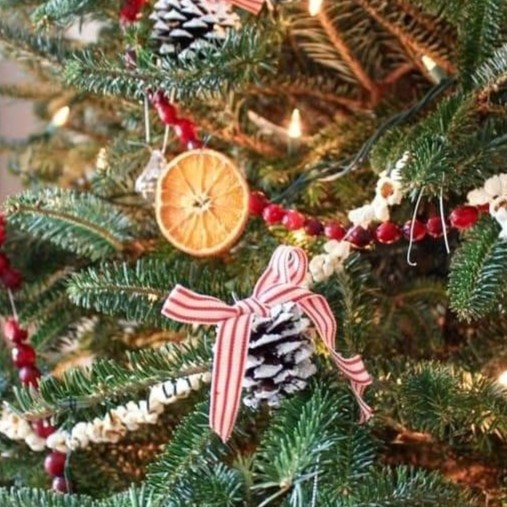
Christmas is famous for being a time of excess; a remarkably wasteful holiday. However, with a little time, effort and planning, it is possible to have a sustainable Christmas, and it is easier than you might think. This festive season lets try to minimise our part in climate change and promote ethical, eco-friendly practices.
The Christmas Tree and Decorations
A 6.5ft artificial tree has a carbon footprint of 40kg of greenhouse gas emissions, start your sustainable Christmas off right by buying or renting a real tree that will continue to act as a carbon sink in your home. You could buy a live potted tree and keep it in the garden year round, bringing it into the house for December. Alternatively, see if there is a tree renting scheme near you where you can use a tree over the Christmas holidays and then return it to be cared for until next year. If you buy a felled tree make sure it was sustainably sourced, check that the company you purchase it from is accredited.
When it comes to decorating for Christmas you could get creative and make some of your own decorations from basic household items such as origami stars and popcorn garlands. Try to avoid mass produced decorations and instead choose ornaments made from recycled or sustainable materials such as glass or wood. Avoid any decorations involving glitter, as it contains harmful microplastics.
Use LED Christmas lights, these are energy efficient so consume significantly less energy and last longer than generic Christmas lights. Thus reducing your energy bill and your carbon footprint simultaneously.
A natural centrepiece or table decorations could add a charming touch to your Christmas dinner, you could forage for seasonal greenery (such as holly), pinecones and use dried fruits or flowers to create a beautiful arrangement.
Christmas Cards
Try to purchase handmade, sustainable cards made from recycled materials, this could allow you to avoid plastics and support a small business. Again, you could get creative and make your own, personalised cards. This could be a really fun activity for the whole family. Alternatively you could send digital cards to family and friends far away, these can be personalised with pictures, videos and audio recordings.
Gifts and Wrapping
Making your own gift wrap is an easy, festive activity that could really get you into the Christmas spirit. You could buy brown or recycled paper and decorate it yourself. This would allow you to personalise all the gifts you give. Other wrapping ideas to avoid store-bought paper include newspaper, reusable bags and fabric wraps. Instead of tape you could use ribbon or string to secure the gifts.
When it comes to the actual gifts, steer clear of single use plastics and palm oil. You could buy reusable gifts that have a long life span (think reusable coffee cups). If you want to give gifts with an environmental theme, to promote environmental consciousness and green consumer choices this christmas, some ideas are bird feeders, live plants, and gifts made from recycled or sustainable materials. Choose fairtrade and ethically made gifts that give back to communities and the local economy.
Think about how you could repurpose items that you own but don’t use or want into gifts or charitable donations, this is an amazing option because you sidestep the environmental impact associated with new mass produced products.
Another gift option is to give someone an experience rather than something material. Tickets to shows, concerts or events could be great gifts that create lasting memories.
Christmas dinner and snacks
Shop seasonally and locally, this reduces your food miles, groceries that have been imported or transported long distances have a higher carbon footprint than locally sourced produce. This also means you are able to support small/local businesses.
Try to reduce or avoid food waste as this is a massive problem. In the UK alone during Christmas almost 270 000 tons of food is wasted. Plan your meals and shopping carefully to avoid overbuying or having a pile of leftovers after Christmas dinner. Think about whether leftovers could be frozen or donated to a local charity to avoid having to throw stuff away.
Home baked goods are a perfect fail-safe gift in case you’ve forgotten anyone or are struggling to come up with gift ideas, choose locally sourced ingredients and use minimal packaging. Homemade snacks also contribute to a more sustainable food culture.
Food production is the leading cause of deforestation in tropical areas. Try a plant based, Christmas dinner, or reduce the amount of meat and dairy used in your meal by adding some plant-based options. Poultry is in the top 10 most wasted foods and livestock industries generate 14.5% of all greenhouse gas emissions. Eat more plants this Christmas and help celebrate our planet too!






